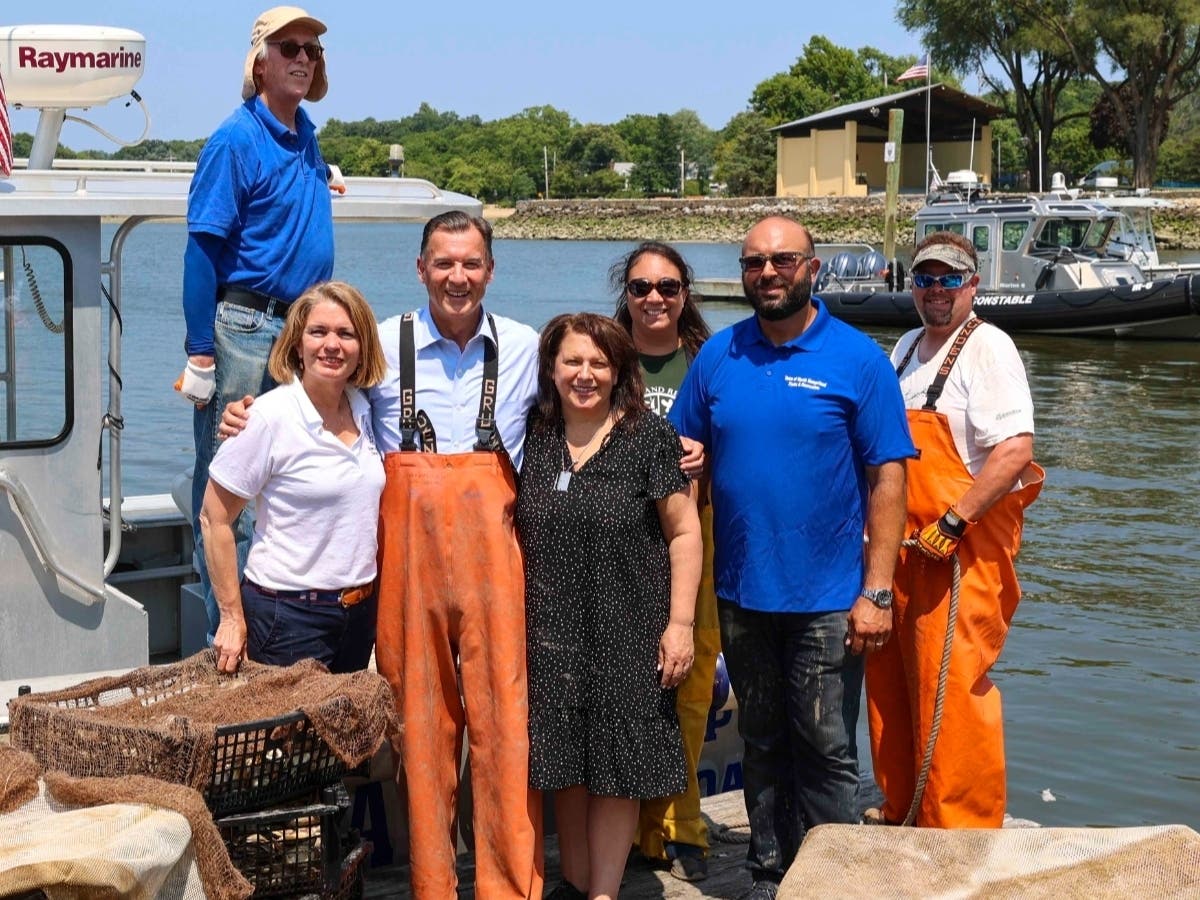Community Corner
Another Half-Million Oysters Planted in Manhasset Bay
Restoring the oyster population and improving water quality go hand in hand.

NORTH HEMPSTEAD, NY — Another 500,000 spat-on-shell oysters have been planted in Manhasset Bay thanks to $100,000 in funding secured by US Rep. Tom Suozzi.
This is the latest effort in an initiative introduced by Council Member Mariann Dalimonte in 2022 to restore clean water and oyster beds to the bay, which is so polluted that shellfishing for the few oysters left is prohibited.
“Establishing oyster reefs are an important tool for restoring our bays," said Eric Swenson, Executive Director of the Hempstead Harbor Protection Committee. "They provide natural filtration of nutrients which helps prevent algae blooms and the depletion of oxygen and help to restore habitats that benefit other marine life.”
Find out what's happening in Great Neckwith free, real-time updates from Patch.
The project is coordinated between the federal government, the Town of North Hempstead, the Manhasset Bay Protection Committee, and the Hempstead Harbor Protection Committee.
Find out what's happening in Great Neckwith free, real-time updates from Patch.
“It’s estimated that just one oyster can filter up to 50 gallons of water a day, so 500,000 could potentially clean 25 million gallons per day,” said Supervisor Jennifer DeSena. “That’s a natural way to clean Manhasset Bay, one of North Hempstead’s natural treasures enjoyed by thousands of people. Congressman Suozzi values that and we’re grateful to his ongoing commitment to its preservation.”
Shellfish can become contaminated if they live in polluted water. Shellfish pump water around their bodies to obtain oxygen and filter out tiny plants and animals for food, according to the state Department of Environmental Conservation website. This filtering may also pick up disease-causing microorganisms (bacteria, viruses and certain dinoflagellates) that can be eaten with the shellfish. If water quality is not up to New York State and national standards, DEC closes the area to shellfish harvesting.
Suozzi obtained a $300,000 appropriation for the program that will ultimately include a total of 5 million spat-on-shell oysters planted over three years (2024-26) — split evenly between Manhasset Bay, Hempstead Harbor, and Oyster Bay / Cold Spring Harbor.
"Spat" is the word for the tiniest form of shellfish that has settled onto the place where it will live out its life, according to the folks at Cornell Cooperative Extension of Suffolk County, which has been working with the town on the long-range project.
"What we're trying to do is create sanctuaries where we put a lot of shellfish in a small area and hope they will reproduce," CCE Associate Marine Program Director Lorne Brousseau told Patch. "They'll grow, mature, reproduce and the gametes they produce will drift to other parts of the bay."
The long-range goal is to create self-sustaining colonies of oysters. Then down the road if the water quality improves the bay can be reopened to shellfishing.
"Throughout my 30 years in public service, I have worked on restoring shell fishing beds, reseeding our harbors, cutting nitrogen from sewage treatment plants and stormwater runoff, and cleaning up pollution in the Sound," Suozzi said. "Since coming to Congress in 2017, I have helped deliver an increase of 1000 percent in the funding to improve the Long Island Sound.
"Thanks to the efforts of many, including the Town of North Hempstead, Hempstead Harbor Protection Committee, Coalition to Save Hempstead Harbor, Manhasset Bay Protection Committee, Cornell Cooperative Extension, Friends of the Bay, the Oyster Bay/Cold Spring Harbor Protection Committee, and more, dramatic improvements have been made to water quality. Protecting and preserving the Long Island Sound, our 'National Park,' and its shell fishing heritage is a top priority and a shared responsibility."
For thousands of years, before it became too polluted, Manhasset Bay was used for shellfish harvesting. Port Washington was the largest shellfishing port on the North Shore of Long Island in the late 1800s, according to the Long Island Sound Study.
:We have worked extraordinarily hard over the last several of years to turn this practical and innovative program into a reality and I am so pleased with its success," Dalimonte said. "I am immensely grateful for the hard work of Lorne Brousseau, Christopher Pickerell, and the entire team at Cornell Cooperative Extension of Suffolk County. Additionally, I would like to express my deepest appreciation for Congressman Tom Suozzi, who’s always been a strong and advocate for the Town of North Hempstead and our environment.”
Working with the town, the team from Cornell Cooperative Extension of Suffolk County will continue to assess the oyster population in the coming months to monitor the program’s progress.
Get more local news delivered straight to your inbox. Sign up for free Patch newsletters and alerts.
